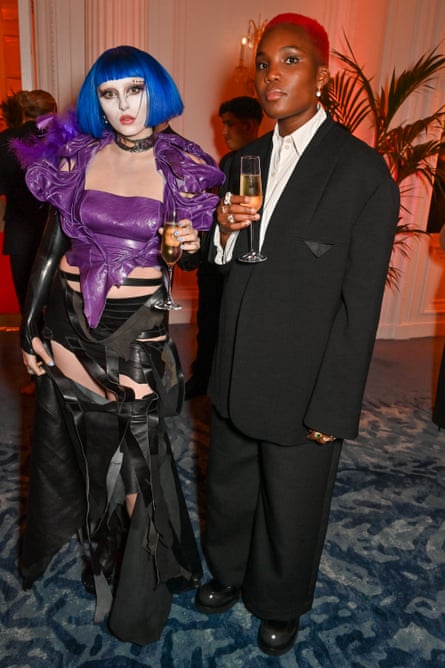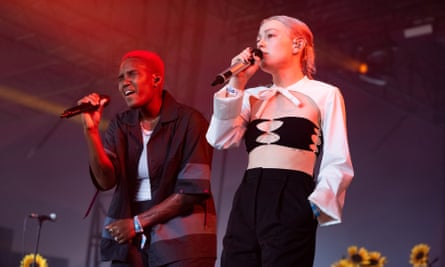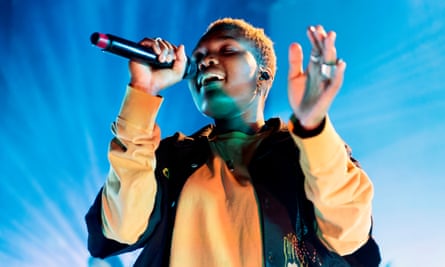Driving along the mountain-flanked Angeles Crest Highway in southern California, Arlo Parks played her new album for her girlfriend for the first time. A sunny, spacious record fizzing with the promise of new love, she wanted it “to throw people off balance a little”. The couple turned off and parked the car, music still playing as they looked out over the city of Los Angeles, the singer-songwriter’s new home. “She loved it,” says Parks.
LA is a long way from Hammersmith, London, where the 22-year-old performer born Anaïs Oluwatoyin Estelle Marinho grew up and wrote her first EP, 2019’s Super Sad Generation. The tenderness and candour of Parks’ melancholy bedroom pop gives it a quiet power, a quality that has propelled her steady ascent. Her breakout hit, Black Dog, a delicate heartbreaker about bearing witness to a close friend’s debilitating depression, became an unofficial anthem of the pandemic, then, in 2021, her debut album, Collapsed in Sunbeams, was lauded in this paper as “the arrival of a major new talent”. It won her the Mercury prize; Billie Eilish told Vanity Fair that Parks was one of her favourite artists and invited her to open for her at her concerts in London. Parks spent 2022 travelling the world, playing shows with Harry Styles, Lorde and Florence + the Machine.
I speak to Parks in mid-January, when she is back in London to announce her second studio album, My Soft Machine. It is punchier and more synth-driven than her debut; she cites Jai Paul, Joy Orbison and John Glacier as the inspiration behind its dreamier, dancier sound. It is a bright and frosty afternoon on Hampstead Heath and the winter sunlight keeps catching on her rings. “I just feel this need for forward motion all the time,” she says, charging down a muddy, leaf-strewn path, swaddled in a mauve jumper and North Face puffer jacket. Parks is bubbly and talkative; she speaks with the self-assurance of a person who has a lot of older friends. “My mind goes at a million miles a minute, but recently I’ve really cherished calm.”
On a new song, I’m Sorry, Parks reads a poem about “working incessantly, like a wasp, feeling trapped and crazed”. In September, she hit breaking point, cancelled some US tour dates and told fans on Instagram that, after 18 months on the road, she was burnt out, “exhausted and dangerously low”. She switched off her phone and returned to London to rest.
Parks remembers feeling relief, but also fear. “Any time you’re that vulnerable, you’re afraid of how people will react,” she says. She felt she had a duty to be honest about how she was feeling and to admit she was human. “Even though people already knew that, I hoped it would encourage more awareness of that in the future.” Did it mean admitting to herself that she was human, too? “Kind of. I’ve refuted it since,” she says, cackling.
“I’m just always going so hard,” she then says, softly. “I don’t know what drives me to be on 24/7, but I have to remind myself: ‘Hey, just take it a bit easy.’” Parks has insomnia and works out every day in order to sleep. She describes her urge for perpetual motion as all-consuming. In this sense, she is like many 22-year-olds, hungry for new experiences. “I just want to be learning, doing, meeting people, moving.”
After that Instagram post, Parks turned her phone back on to a stream of supportive messages from friends including the indie singers Clairo and Maggie Rogers. “I don’t think I wanted to say much more at that time,” she says. “I was still trying to get back to myself.”

On her birthday, about a month before, she had captioned an Instagram photo dump: “The year I fell in love, the year dreams materialised, the year the music truly reached.” She met her girlfriend, the blue-haired punk rapper Ashnikko, moved from London to LA and performed to crowds after months spent alone and inside during lockdown. “A lot happened,” she says. It is this period that My Soft Machine preserves, with Parks chronicling exquisite highs and crushing lows in startlingly intimate detail.
Each song is a mini-movie, focused on a single day. Her lyrics relay a hungover morning in Brooklyn, falling asleep next to a new lover, the sense memory of “petrol in the air, wisteria and scrambled eggs” transporting her back to one particularly hopeless day. “The things I’m writing are not really about the external chaos – the magical chaos – that I was in,” she says. “It’s all very zoomed-in. I found it really comforting to go small when so many things were happening around me.”
It is when she talks about those domestic scenes – of decorating her new kitchen with mint-coloured chairs, or watching Salt, Fat, Acid, Heat and deciding to become a better cook – that Parks becomes especially animated. She tells me about a dinner party she and Ashnikko hosted. “There were corn ribs and harissa and we made these pears poached in Earl Grey. It was sick,” she says with a sly grin. Those moments of respite are even more precious given how rarely she is at home.
Parks played her first show in spring 2019, so she was just getting started when the world shut down. Once restrictions began to lift, she found herself honouring rescheduled gigs, playing to new fans and supporting Styles. The shows ranged wildly in scale. “It was playing on a boat with 100 people, then doing Glastonbury,” she says. The experience taught her how to give all of herself to an audience, no matter who was watching. “It transformed the way I approached the next record,” she says, craving moments where people could dance, shout the choruses and crash into one another.
She tells me about a memorable string of shows. Parks went from supporting Styles in Dublin straight to Glastonbury, where she played a solo set and another with her friend Phoebe Bridgers. She rushed to London to open for Billie Eilish at the O2 arena, then drove back to Worthy Farm to play the Pyramid stage with Lorde and Clairo the following day. “This is all in a row,” she clarifies.
Parks describes those few days as physically exhausting, “because there is so much adrenaline coursing in and out of you”. She wasn’t prepared for how tired her body would feel afterwards. Emotionally, she says, it was impossible to process: “All I had was focus: ‘Make sure you make this count.’” She couldn’t take it all in while it was happening. “It’s only when I’m watching videos afterwards, or after I’ve sat down and had a cup of tea, I can let it sink in.”
Parks was learning the hard way about her personal limits: “You start to figure out: OK, I can do this amount of months out of the year.” She is reluctant to put a number on what would feel sustainable for her as she stares down the cycle for her second album. “Just not as much as last year, basically.”
The openness with which Parks speaks about her mental health has meant fans view her as an ambassador and a friend. By cancelling her US tour – just as Sam Fender and Wet Leg were also admitting to needing breaks for burnout – Parks sparked a wider conversation about how much is healthy for an artist to take on. Her hope is that those drawing up the schedules will prioritise the person “behind whatever moment they’re having, or whatever wave they’re trying to perpetuate”. Musicians, she says, are people, too, “who deserve to have a bit of time at home, and cuddle dogs, and be human beings for a second”.
Above the garden of Parks’ new house is a sprawling bougainvillaea bush. The first time she visited LA, she thought the vibrant blooms were the most beautiful in the world. She moved there in May 2022, after spending a lot of time in the city for work. “There was the sense of wanting a new adventure,” she says. “I like the pace of life there. I like the fact that you’re so close to the ocean, the mountains; you can drive up to Big Bear, you can go out to Joshua Tree.”

The songs on My Soft Machine are illustrated by peonies and pollen, sandflies and gingko leaves, dog rose, wisteria and wild bees on the heath. “I have been spending a lot of time out in nature,” she says. Parks took walks and collected audio recordings of “weird little crunches” that she would later bury deep in the new tracks. When she went into the studio to start recording, she discovered a copy of Mary Oliver’s Devotions laying on the sofa. The late American poet is best known for her luminous nature writing (“You only have to let the soft animal of your body love what it loves,” she writes in Wild Geese). “I don’t know who left it,” she says. “A gift from the universe; it was just sitting there.”
Film also left its mark. In Connecticut, she spent some time with the producer Danger Mouse, whose knowledge of cinema she describes as “encyclopedic”. They watched Powell and Pressburger’s The Red Shoes and Paweł Pawlikowski’s road movie Ida. “How I approach my music is very scene by scene,” she says.
When the album was almost finished, Parks watched Joanna Hogg’s The Souvenir. It stars Tom Burke as a controlling and tempestuous civil servant, who in one scene attempts to explain the appeal of movies to his younger film-maker girlfriend: “We don’t want to see life as it is played out – we want to see life as it is experienced, in this soft machine.” “When I heard that phrase, the whole rest of the film kind of melted away for me,” says Parks. She was drawn to its contrast, “the avoidance and anxious attachment in love, the sense of wanting to be numb and push away, then draw someone close”. It became the title of the album.
One of its most striking tracks sees Parks reckoning with the substance abuse and self-destruction of someone close to her. “B-roll of us in my lids / Dusting the coke off your fist / You were so far up / I would worry desperately,” she sings on Room, her vocals featherlight. I ask her about the story behind that song. For the first time in our conversation, she seems guarded. “I don’t know if I’ll talk about that, ’cause it’s kind of dark,” she says. “I still have to figure out how to talk about that.”
She also draws a boundary when I ask how she met Ashnikko, whom she posts about regularly. The pair recently celebrated their one-year anniversary. “If I start to talk about it, then it becomes not our story any more,” she says. “Even though we’re both public figures out in the world negotiating that and writing songs about each other, I’m trying to keep those moments just for us.” What she will say is that this album is “the first time I’ve felt moved to write about love in that candid way”.
Parks writes with astonishing clarity about the terror of saying “I love you” and the vulnerability required to allow someone to say it back. She wrote the song Pegasus about “the absurdity of two people coming together at the exact right time”, inspired by the image of the mythological winged horse, which shouldn’t be able to fly. She sent Bridgers the track and asked her to sing on it. “We both have a deep love of Elliott Smith and songwriting that feels like open-heart surgery,” says Parks. The two met in London when Parks was 19 and have performed together at Coachella and Glastonbury. “She just has older-brother energy. I look up to her a lot,” Parks says.
When Parks made Collapsed in Sunbeams in quarantine, the album emerged fully formed, spare but crystal clear. “It just came out how it was,” she says. This record was different. With longer to make it, and more collaborators involved – including Ariel Rechtshaid (Haim) and Buddy Ross (Frank Ocean) – there was a gradual whittling of demos into a fuller, more muscular sound. She replaced the drum machines with live drums to add warmth. She wondered if the production would amplify her words or drown them out. “That was the hard thing,” she says. “It took a lot of patience, which I struggle with,” she says, reaching for her necklace (a gift from Ashnikko) and fiddling with its strawberry and bunny charms. The result is more layers, texture and presence – the sound of Parks taking up space.
She is anxious and excited about sharing it with the world. “I think it’s just the nerves of being perceived again,” she muses. Parks is emerging from “an insular, creative whirlwind”, eyes still adjusting to the light. After spending a long time in her “little incubator”, delving into the details of her life, she is ready to step back and look at the bigger picture. “I just allow myself to have those moments of nerves and then I get really excited again. It just means a lot to me.”

